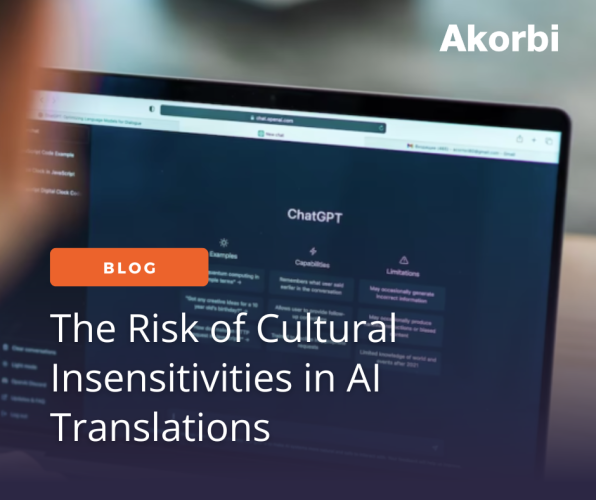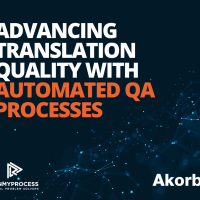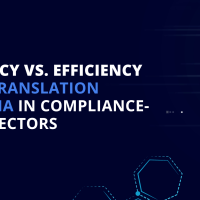
Solutions, Technology
Jul 11
The Risk of Cultural Insensitivity in AI Translations
Revolutionary advancements in Artificial Intelligence (AI) technology have transformed the way we communicate and engage with technology. AI models, such as ChatGPT, have proven to be incredibly useful in facilitating efficient and widespread translations. This breakthrough has greatly reduced language barriers in the global business landscape, promoting improved international collaboration and understanding.
However, the widespread use of machine translations has highlighted a significant challenge: cultural insensitivity. This issue is not limited to any specific AI model, but rather affects the entire field of Machine Translation. Cultural insensitivity occurs when algorithms, no matter how advanced, fail to recognize and respect cultural nuances. As a result, occasional misinterpretations and unintentional perpetuation of stereotypes can occur.
It is crucial for us to be aware of these potential pitfalls and work towards minimizing cultural insensitivity in AI-driven translations. By understanding and accounting for cultural nuances, we can ensure accurate and respectful translations that foster true cross-cultural understanding.
What causes cultural insensitivities in AI translations?
One of the main causes of cultural insensitivity in AI translations stems from biases present in the training datasets used to develop AI models. If the data used to train these algorithms is biased or unrepresentative, it can severely impact the AI's ability to understand and interpret cultural nuances accurately. Biases in training data can arise from various sources, including historical imbalances, societal prejudices, or the limited availability of diverse and inclusive datasets. AI algorithms may be builton a biased or unrepresentative corpus, as the first large language models were all trained on existing written material entirely produced by humans. Furthering the potential errors, asthe amount of AI-produced text grows, it becomes part of the data used to train AI engines, reinforcing errors and leading to a deterioration in output quality.
Additionally, under-representation or the absence of certain cultural groups in training datasets compounds the problem of cultural insensitivity. When specific cultures or marginalized communities are not adequately represented, the AI models may fail to capture the diverse linguistic and cultural variations within those groups.
Additional risks of cultural insensitivity in AI translations:
When it comes to translating idiomatic expressions or culturally specific metaphors, one challenge is: AI models lack the cultural context and may struggle to accurately capture the intended meaning behind these idioms, leading to translations that miss the mark or even convey an entirely different message.
We can also encounter issues of insensitivity when translating names, especially those reflecting cultural traditions and honorifics. Translation systems may not consider the cultural implications of certain names, leading to inaccurate or impolite translations. This can result in misunderstandings, unintentional offense, or even erasure of cultural.
Cultural nuances related to politeness and formality can also pose challenges for AI translations. Different cultures have varying expectations and norms regarding appropriate levels of politeness and formality in communication. AI models that are not trained on diverse datasets and may lack an understanding of cultural etiquette, resulting in translations that are overly formal, which can come across as distant or cold, or overly informal, which can be seen as disrespectful or inappropriate.
Lastly, neglecting or misreading emotional cues and cultural nuances can result in miscommunications in AI translations. Certain languages may use specific ways of expressing emotions or handling sensitive topics that do not translate well literally. If AI models exclusively depend on literal translations and ignore emotional or cultural backdrop, the translated content may fall short of conveying the desired sentiment, leading to misperceptions or even insult.
Strategies for mitigating cultural insensitivity in AI translations:
Culturally Diverse Data:To effectively counter cultural insensitivity in AI translations, developers must prioritize the use of impartial and diverse training data that accurately represents all cultural groups. By incorporating a wide range of linguistic and cultural perspectives into the training datasets, AI models can better understand the nuances and variations within different cultures. This helps in producing translations that are not only accurate, but also culturally sensitive, avoiding biases and stereotypes.
Human-in-the-Loop:Introducing a human element into the decision-making process is another crucial step towards achieving culturally sensitive translations. Human expertise is invaluable when understanding the intricacies of language and culture. By involving human translators, cultural advisors, or subject matter experts in the translation process, developers can gain insights and perspectives that may not be readily captured by AI algorithms alone. These experts can contribute to ensuring accurate translations and identifying potential instances of cultural insensitivity that may arise.
Prioritizing Cultural Sensitivity
Developers must prioritize cultural sensitivity in AI translations to avoid misrepresentation, perpetuation of stereotypes, and harm to cultural groups. This can be achieved by using unbiased and diverse training data, emphasizing cultural sensitivity during model development, and incorporating human intervention. By committing to these values, developers can ensure that AI models effectively represent all cultural groups and promote inclusivity in the technology sector. Addressing cultural insensitivity in AI development is crucial to prevent harmful implications and ensure accurate and respectful technology for users across various sectors.
Ensure Accuracy and Cultural Sensitivity with Akorbi
If you need assistance in creating accurate and culturally sensitive translations, Akorbi can help. With our team of professional linguists who work in their native language and possess a deep understanding of cultural sensitivities, we can fulfill the "human in the loop" requirement to ensure high-quality localization tailored to your specific needs.
For more information on what we can bring to your organization, call us at toll-free at 1-877-425-6724 or contact us online today.



